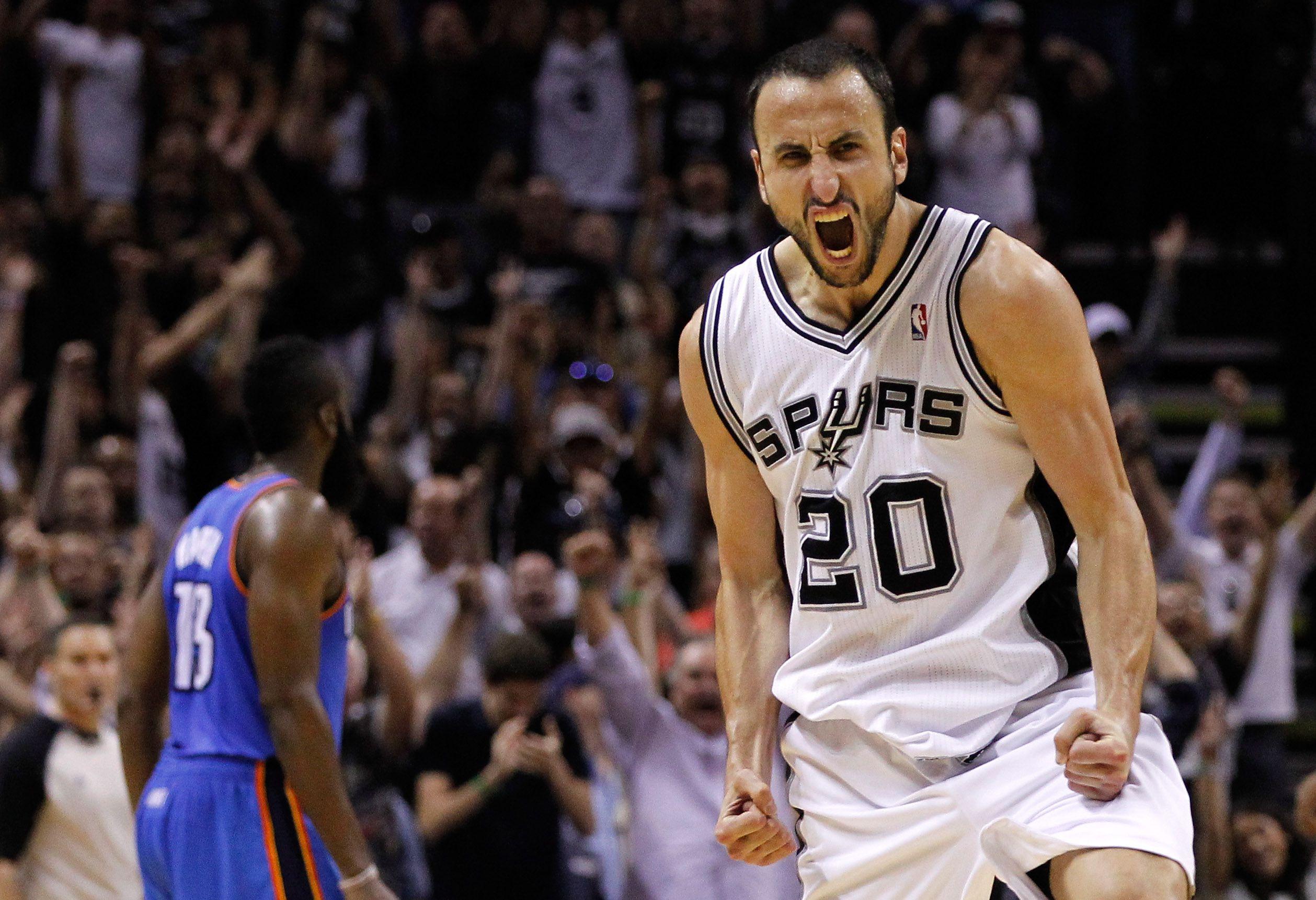When Manu Ginobili’s name was called with the second-to-last pick in the 1999 NBA draft, he was sleeping. He was with the Argentine national team at a tournament in Brazil, unaware the draft was even taking place. His coach woke him up with the news. “Are you sure?” he said. He was just 21, a shooting guard for Reggio Calabria in Italy’s second division. He couldn’t believe it.
Ginobili’s pro career had just begun. He had talent, but he was so far off the NBA’s radar that Rod Thorn, in announcing the selection, didn’t know how to pronounce his name. That anonymity was part of the appeal for the Spurs, who had just won their first NBA title and wanted international prospects to “draft and stash.”
So with the 57th pick, San Antonio took a spirited lefty from Bahía Blanca, a basketball-obsessed coastal town in the province of Buenos Aires, Argentina. ESPN awarded them a D for their draft, which also netted a Croatian guard named Gordan Giricek, writing, “We’ll admit we don’t know a whole lot about these guys because the boss won’t spring for scouting trips to Europe.”
Spurs head coach Gregg Popovich has said many times that the key to his success was drafting Tim Duncan in 1997. This is broadly true, but it perhaps understates the importance of the pick the Spurs made two years later.
That pick, arguably the greatest draft selection of all time given when he was selected, became the heart and soul of the most successful pro basketball team of the century. Manu won four NBA championships and an Olympic gold medal, became one-third of one of the winningest trios in NBA history, and left an indelible mark on the NBA. He popularized the Euro-step, revolutionized the role of the sixth man, and played with a singular style that transformed the champion Spurs—and eventually, the rest of the NBA. He’s beloved in San Antonio, in Argentina, and beyond. And on Saturday, he’ll be inducted into the Hall of Fame.

Spurs CEO R.C. Buford said the first time he saw Manu play that “he was like a wild colt out there, just doing shit. Some of it made sense, some of it didn’t.” That never really changed, even as he lost his mane. But the more you watched him, the more sense he made. He seemed almost out of rhythm at first, careening on the edge of control, until you realized he had a rhythm all his own.
Manu joined the Spurs in 2002, after three more seasons in Europe. The “wild colt” found himself on a team that prided itself on order. Its guiding principle, “pound the rock,” was adapted from the stonecutter’s credo, a quote from a 19th-century Dutch American social reformer that hung in the locker room and reinforced a steadfast commitment to process and solidity. Pop, a former Air Force major, ran their offense from the low post and preached defense. Their best player was nicknamed “The Big Fundamental” and his signature move was a 12-foot bank shot.
Manu, on the other hand, was known for nutmegging fools. He was smooth yet disjointed in a way that made him difficult to defend. Raja Bell once said he was the hardest player he ever had to guard. “I made a living studying offensive players,” said Bell, now a Ringer podcaster. “I couldn’t figure him out.” Manu was un-figure-out-able; he seemed to have a slightly different relationship to space and time than everyone else on the court. The flow of basketball isn’t necessarily predictable, but it does proceed with a certain cadence and rhythm. Good players understand how to operate within the flow; great players dictate it. But Manu had his own way of subverting it—of operating outside the flow without disrupting it.
Clips of his best plays don’t tell the whole story. A YouTube supercut can convey some of Ginobili’s creativity, but it won’t show how he jolted the game, or the extent to which he could turn a run-of-the-mill cut into a bucket, or a seemingly harmless interception into a toe-tapping, nutmegging, and-1 one-man fast break.
One of my favorite Manu plays comes from a random regular-season game, fitting for a player who synthesized casual greatness and recklessness whenever he took the floor. After missing a 3, he is set to receive a pass from Tiago Splitter out near half court. Rather than reset the possession, Manu approaches the ball like a third baseman charging a slow grounder; he begins his throwing motion before he catches the pass, and in that same motion fires a rocket through a thicket of arms for a wide-open layup. (I’ll always remember this play, but it’s not even his most ridiculous in the category.)
The quintessential and climactic Manu play is his emphatic dunk over Chris Bosh in the clinching game of the 2014 Finals. Like so much of Manu’s greatness, it came out of nowhere. He was 36 at the time, but the play had all the makings of a vintage Ginobili drive—the north-south attack; the gather; the long strides as he approached the rim; and the fearless finish.
(Because there’s no such thing as enough Manu highlights, I’ll just leave the following: the pass fake that taught Kevin Garnett that anything is possible, or this one on Kevin Durant; choose your favorite between-the-legs pass; shutting down James Harden in the playoffs before it was cool; slapping a bat out of the air and carrying it off the court ON HALLOWEEN; and, of course, his streaking game-winner in the 2004 Olympics, the most iconic shot of his career.)
In Manu, tenacity and creativity blended to create beautiful, leaning drives. Talent and recklessness collided to produce eye-popping highlights—but also head-shaking mistakes.
Manu threw ill-advised passes, gambled on defense, and launched 3-pointers early in the shot clock. All that rankled his coach, who rode him hard during his early years and struggled to get him to fit within the Spurs’ established style—which in turn frustrated Manu. “It wasn’t easy to adapt to having a coach like him, to having to be a specific part of this game plan,” Manu said later. The friction between player and team could have sanded Manu down or imploded the Spurs.
But eventually, Popovich realized that Manu being Manu worked more often than not—that the occasional turnover or contested shot was a small price to pay for his brilliance. He recognized that Manu’s game was fueled by a profound desire to compete and that it would be a mistake to temper that down. “He’s a freaking winner,” Pop said. “I came to the conclusion that it had to be more his way than my way.”
Manu’s way became integral to the Spurs’ way. His competitive spirit gave them a ferocity on the court, and his leadership and joviality brought them together off it. When Manu agreed to come off the bench at the expense of his individual stats and star power, he cemented the team-first values that propelled the Spurs to prolonged success. When Pop held his tongue when Manu’s freelancing went awry, he empowered him to operate outside the rigid confines of the Spurs’ blueprint.
Over time, the tension that characterized Manu’s early Spurs tenure simmered into the secret sauce of the Spurs’ dynasty. Set within a system like the Spurs’, Manu’s improvisational exploits popped. And in Manu, the Spurs found a verve and unpredictability that made them truly great.
Another favorite highlight encapsulates that symbiosis. It’s a pass, fittingly, that comes during the flow of the offense, on what looks to be a designed play—but only Manu would consider Patty Mills open here. Manu steps up to meet the initial pass, effectively opening up more room along the baseline, then goes behind his back because the baseline side is the only side from which this pass can realistically arrive, given the positioning of Mills’s man and the help defender. The delivery is so perfect that Mills seems to catch the ball on its way into the hoop rather than catch it and then shoot it himself.
Yet, to truly appreciate Manu, it’s important to remember that his daring plays and wild passes didn’t always work, and they never went away. He represents an alternative to the classic sports story of an athlete who excises their bad habits and matures into greatness. With Manu, you never forgot the mistakes—and if you did, he would inevitably soon remind you—but through his sheer force of will and genius, you always got over them.
Perhaps no sequence captures the duality of the Manu experience—the seesaw between frustrating plays and spectacular ones, and his courage to attempt the latter despite the former—better than Game 1 of the 2013 Western Conference semifinals. After appearing to cost the Spurs the game with an ill-advised shot, Manu hit the game-winning 3-pointer in double overtime. And perhaps no quote captures what it felt like to watch Manu better than the one Pop gave after the game: “I went from wanting to trade him on the spot to wanting to cook breakfast for him tomorrow morning. That’s the truth. When I talk to him and say, ‘Manu,’ he goes, ‘This is what I do.’”
Manu made his fair share of boneheaded decisions on the basketball court, and he didn’t always get the chance to redeem himself 45 seconds later. But he never stopped playing hard, he never played with fear, and he never changed. In that sense—the sense that matters—he did “pound the rock.” And after enough hammering, the NBA’s most rigid system bent to reflect its most creative and determined force; because with a player and person like Manu, that’s really the only choice. You can’t split a rock in one blow, but if you angle your mallet a different way, you just might jolt something loose.
